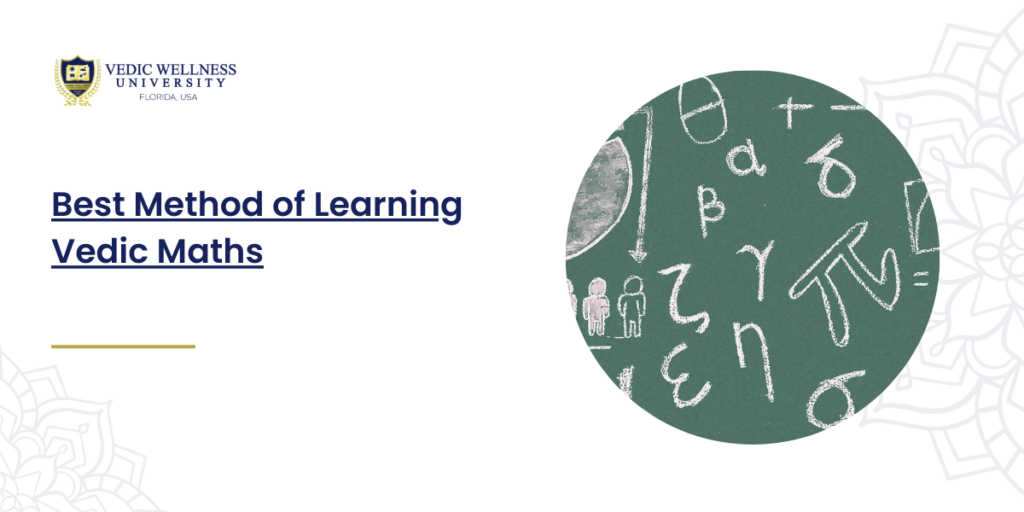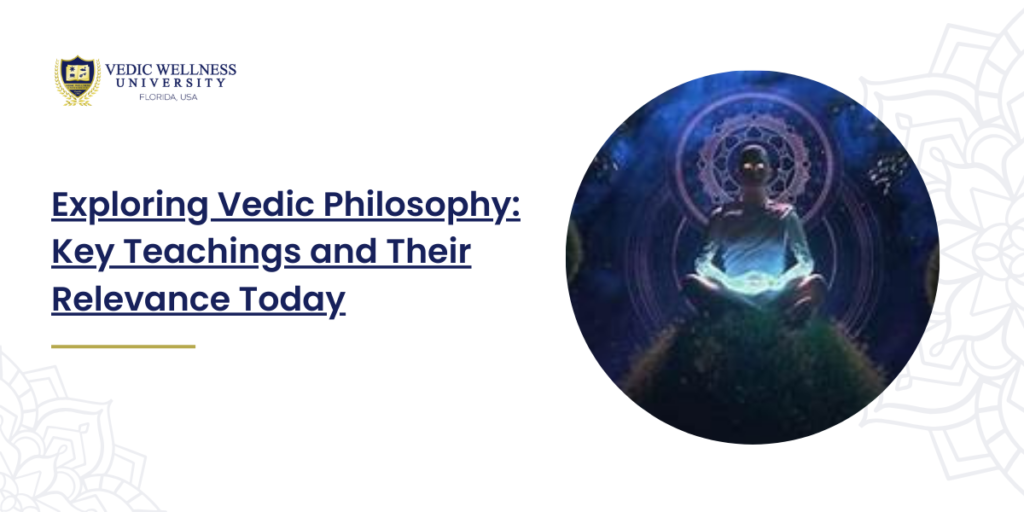Best Method of Learning Vedic Maths

Introduction to Vedic Mathematics “सत्यं ज्ञानमनन्तं ब्रह्म”(satyam jñānam anantam brahma)“Truth, knowledge, and infinity are Brahman.” Vedic Maths is an ancient Indian system of mathematics that originated from the Vedas, specifically the Atharva Veda. It was rediscovered in the early 20th century by Sri Bharati Krishna Tirthaji, who compiled it into a system of 16 sutras (aphorisms) and 13 sub-sutras. These sutras encompass various mathematical operations and problem-solving techniques that make calculations simpler and faster. Vedic Mathematics was traditionally taught through oral transmission and manuscripts, emphasizing mental calculations and intuitive understanding. Importance of Vedic Mathematics in Modern Day In today’s fast-paced world, the ability to perform quick and accurate calculations is invaluable. Vedic Mathematics offers a significant advantage to students preparing for competitive exams like CAT, GMAT, and GRE, where speed and accuracy in solving mathematical problems are crucial. Beyond academic exams, Vedic Mathematics is also beneficial in everyday life, enhancing one’s ability to perform mental arithmetic and problem-solving with ease. Common Uses of Vedic Mathematics in Modern Day 1. Quick Calculations Vedic Mathematics simplifies complex calculations, enabling quick mental arithmetic. This is particularly useful in competitive exams where time is limited, allowing students to solve problems faster and more accurately. 2. Cross-Checking Answers Vedic Mathematics provides methods for verifying answers quickly. Techniques like the digital root method help in cross-checking answers, ensuring accuracy in calculations, which is particularly useful in examinations and professional settings. 3. Enhancing Cognitive Skills Learning Vedic Maths enhances cognitive abilities such as memory, concentration, and analytical thinking. These skills are beneficial not only in academics but also in professional and personal life. 4. Simplifying Algebraic Calculations Vedic Mathematics offers straightforward methods for solving algebraic equations. Techniques such as the Vertically and Crosswise method simplify multiplication and division of algebraic expressions, making it easier for students to understand and solve algebraic problems. 5. Boosting Confidence in Mathematics The ease and speed of calculations provided by Vedic Maths boost students’ confidence in their mathematical abilities. This confidence translates into better performance in exams and a more positive attitude towards learning mathematics. 6. Applications in Various Fields Vedic Mathematics finds applications in various fields such as engineering, computer science, and finance. The methods and techniques can be used to simplify complex calculations, optimize algorithms, and enhance computational efficiency. Scientific Applications of Vedic Mathematics As we look towards the future, the principles of Vedic Mathematics hold potential for various scientific applications. Here are five models that could be developed using Vedic mathematical principles: 1. Optimized Algorithm Design Vedic Mathematics can inspire the development of optimized algorithms for computational tasks. Techniques such as the Vertically and Crosswise method can be adapted to create faster and more efficient algorithms for data processing and analysis. 2. Cryptographic Systems The simplicity and speed of Vedic mathematical calculations can be utilized to develop robust cryptographic systems. These systems can enhance data security by using complex mathematical operations that are quick to compute but difficult to break. 3. Quantum Computing Models Quantum computing, which relies on principles of superposition and entanglement, could benefit from the intuitive and efficient methods of Vedic Mathematics. Developing quantum algorithms based on Vedic principles could lead to breakthroughs in computational speed and efficiency. 4. AI and Machine Learning Artificial Intelligence (AI) and Machine Learning (ML) models require extensive calculations and optimizations. Vedic Mathematics can contribute to developing more efficient algorithms for training and deploying AI/ML models, improving their performance and reducing computational costs. 5. Financial Modelling In finance, Vedic Mathematics can aid in the development of models for risk assessment, investment strategies, and market predictions. The quick and accurate calculation methods can enhance the precision and reliability of financial models. Conclusion Vedic Mathematics is a timeless system that bridges ancient wisdom with modern needs. Its principles offer quick and efficient methods for mathematical calculations, making it invaluable for students, professionals, and researchers alike. As we continue to explore its applications, Vedic Mathematics holds the potential to revolutionize various scientific and technological fields. The future of Vedic Mathematics is promising, with endless possibilities for innovation and discovery. “आ नो भद्राः क्रतवो यन्तु विश्वतः”(ā no bhadrāḥ kratavo yantu viśvataḥ)“Let noble thoughts come to us from every side.” Embracing the holistic approach of Vedic Mathematics can lead to a better understanding of the universe, fostering growth and enlightenment in every aspect of life.
Exploring Vedic Philosophy: Key Teachings and Their Relevance Today

Vedic philosophy, rooted in the ancient Vedic texts of India, offers profound insights into the nature of reality, human existence, and the path to self-realization. At Vedic Wellness University, we emphasize the timeless wisdom of Vedic philosophy and its application in modern life. By integrating ancient teachings with contemporary relevance, we aim to provide a holistic education that fosters personal growth and societal well-being. The Foundations of Vedic Philosophy Vedic philosophy encompasses the teachings found in the Vedas, the oldest sacred scriptures of Hinduism. These texts include the Rigveda, Yajurveda, Samaveda, and Atharvaveda, each offering unique perspectives on spiritual knowledge, rituals, and ethical conduct. The Vedas serve as the foundation for various schools of thought, including Vedanta, Yoga, and Samkhya. “Ekam sat vipra bahudha vadanti”(Truth is one; the wise call it by many names.)– Rigveda 1.164.46 Key Teachings of Vedic Philosophy 1. The Concept of Dharma Dharma refers to the moral and ethical duties that govern an individual’s conduct. It emphasizes righteousness, duty, and living in harmony with the natural order. Understanding and following one’s Dharma is considered essential for personal growth and societal harmony. 2. The Pursuit of Moksha Moksha, or liberation, is the ultimate goal of life in Vedic philosophy. It signifies freedom from the cycle of birth and death (samsara) and the realization of one’s true nature. The pursuit of Moksha involves self-discipline, meditation, and the practice of ethical virtues. “Atmano mokshartham jagat hitaya cha”(For the liberation of the self and the good of the world.)– Rigveda Relevance of Vedic Philosophy Today 3. Mind-Body Connection Vedic philosophy highlights the interconnectedness of the mind, body, and spirit. This holistic approach is increasingly relevant in modern health practices, emphasizing the importance of mental and physical well-being. Practices like yoga and meditation, rooted in Vedic teachings, are widely adopted for their health benefits. 4. Environmental Sustainability The Vedas advocate for living in harmony with nature and respecting all forms of life. This principle is crucial in addressing contemporary environmental challenges. Sustainable living and ecological balance are fundamental aspects of Vedic philosophy that resonate with modern environmental movements. Vedic Philosophy and Modern Science There is a growing interest in the parallels between Vedic philosophy and modern scientific discoveries. Concepts such as the interconnectedness of all life, the nature of consciousness, and the cyclic nature of the universe find echoes in contemporary scientific thought. 5. Ethical Leadership Vedic teachings on Dharma and leadership provide valuable insights for modern governance and management. Ethical leadership, rooted in integrity and responsibility, is essential for creating just and prosperous societies. “Yatha raja tatha praja”(As the ruler, so the people.)– Mahabharata Learning Vedic Philosophy at Vedic Wellness University At Vedic Wellness University, we offer a comprehensive curriculum in Vedic philosophy, covering the Vedas, Upanishads, and other classical texts. Our courses are designed to provide students with a deep understanding of ancient wisdom and its application in contemporary life. Through a blend of theoretical knowledge and practical experience, we aim to nurture individuals who can contribute positively to society. Conclusion Vedic philosophy offers timeless wisdom that is highly relevant in today’s world. Its teachings on Dharma, Moksha, the mind-body connection, and environmental sustainability provide valuable guidance for personal and societal well-being. At Vedic Wellness University, we are dedicated to preserving and promoting this ancient knowledge, integrating it with modern practices to create a holistic education. Embrace the profound insights of Vedic philosophy and explore its relevance in your life and beyond. For those interested in delving deeper into this ancient wisdom, Vedic Wellness University provides the ideal platform to learn and grow. Join us and discover the transformative power of Vedic philosophy for a fulfilling and enlightened life.

